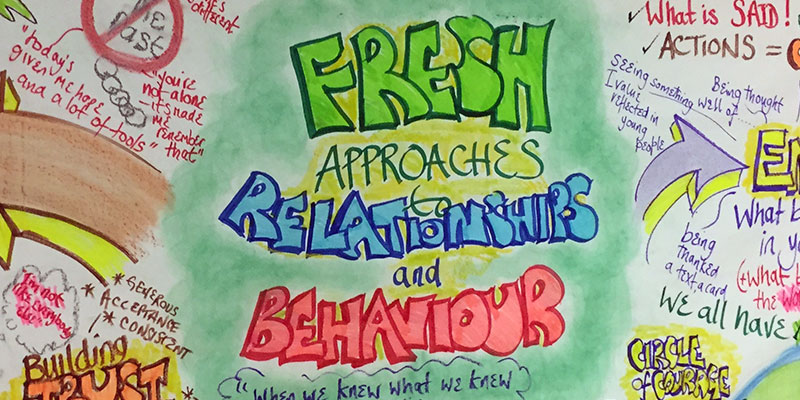
Behaviour: Fresh Approaches to Behaviour and Relationships
This is our lead workshop/training day on behaviour and relationship work in Primary and Secondary schools and Academies, as well as Early Years, FE and adult settings and is both a values primer and a practical guide to successful innovative strategies for improving behaviour and strengthening relationships for challenging children and people of all ages.
Course Category
Behaviour and Relationships
Meeting emotional needs
Early Years
Inclusion
Description
This is our lead workshop/training day on behaviour and relationship work in schools and other settings and is both a values primer and a practical guide to successful innovative strategies for improving behaviour and strengthening relationships for challenging children and young people of all ages.
Not just another day on ‘Behaviour Management’ – our ‘Fresh Approaches to Behaviour and Relationships’ day goes well beyond a rewards and sanctions approach to ‘behaviour’. We will be focused on those young people for whom rewards and punishments do not always work and who confuse the adults who work with them. We aim to take a relationships based approach and to give those attending an opportunity to think more deeply about why young people do the things they do and what our part as adults is in creating, sustaining and changing these behaviours.
The day gives those present opportunities to reflect on their attitudes and practice in relation to children’s behaviour and relationship building. If your usual approaches to managing behaviour aren’t working with particular individuals then take a tour through this range of cutting edge strategies for bringing about positive behaviour change, and for meeting challenging emotional needs.
Testimonials
‘Thank you so much for the excellent training day you delivered last week. I found the whole experience quite uplifting and inspirational.’
‘Thought provoking and empowering. Probably the best training day we’ve had in school’
‘There was already evidence on the first day of school for pupils that staff were adopting a different approach. Thank you so much for helping us to make a difference.’
‘Today has to have been one of the very best INSET days I have personally been to – full of practical tips and techniques to use in the classroom; and also proof that this approach does work in practice. It really was inspirational and an excellent start to the term.’
‘Very motivating and exciting course.’
‘Another fantastic Colin and Derek training session’
‘Enjoyed this course very much. Derek and Colin worked very hard and I understood it. Thank you.’
Learning Objectives
- Reinforce and affirm good practice
- Re-energise, stimulate and challenge thinking about inclusion of challenging young people and children
- Increased understanding about behaviour and emotions
- Increased confidence in managing challenging pupils in childcare settings mainstream schools
- Access to a wider range of practical strategies to impact on behaviour problems
- Opportunity to reflect on professional attitudes and behaviour towards families and children and young people
- Learn new skills and processes to make inclusion successful
Who Is It For ?
- Primary and secondary staff teams
- All Childcare Providers – Out of School club staff/Childminders/Youth Workers
- Early years and school based practitioners
- Heads and deputies
- SENCOs
- Advanced skills teachers
- Primary and secondary teachers
- Year Managers
- Parents
- Local authority support services
Course Content
The course answers the questions:
- Are there any new ways to include our most challenging young people?
- Should we focus on behaviour or relationships?
- How do we go about including high profile children or young people?
- Can we find an alternative to exclusion?
- What would a relationship policy look like?
The following are some of the key themes and tools we are likely to explore during the day
- Getting the welcome right for the most challenging
- Encouraging – getting the best from the most challenging- Circle of Courage – belonging-achievement-generosity – independence
- Active listening – Listening to the person underneath the behaviour
- Compass of Shame – which directions do children and young people head when they feel shame? And what helps children work through these feelings in more healthy ways?
- Involving other children and young people in solutions and interventions – Circles of friends: peer support, counselling and mediation
- Team Problem Solving – Solution Circles: a 30 minute group problem solving process to get Teams ‘unstuck’ and to generate positive first action steps
- Circle of Adults: a process that ‘listens deeper’ to generate reflective problem solving creating lasting behaviour change and effective behaviour intervention plans. A particularly valuable process for those looking to enhance their leadership and facilitation skills
- Restorative justice and restitution: principles and practice of this approach to repairing harm and restoring relationships without reliance on punishment
- Understanding the effects of Separation, Loss, Trauma and Neglect on children’s learning and relationships in school and what adults can do to reach and support these children
If you like this you may like:
Trackback from your site.